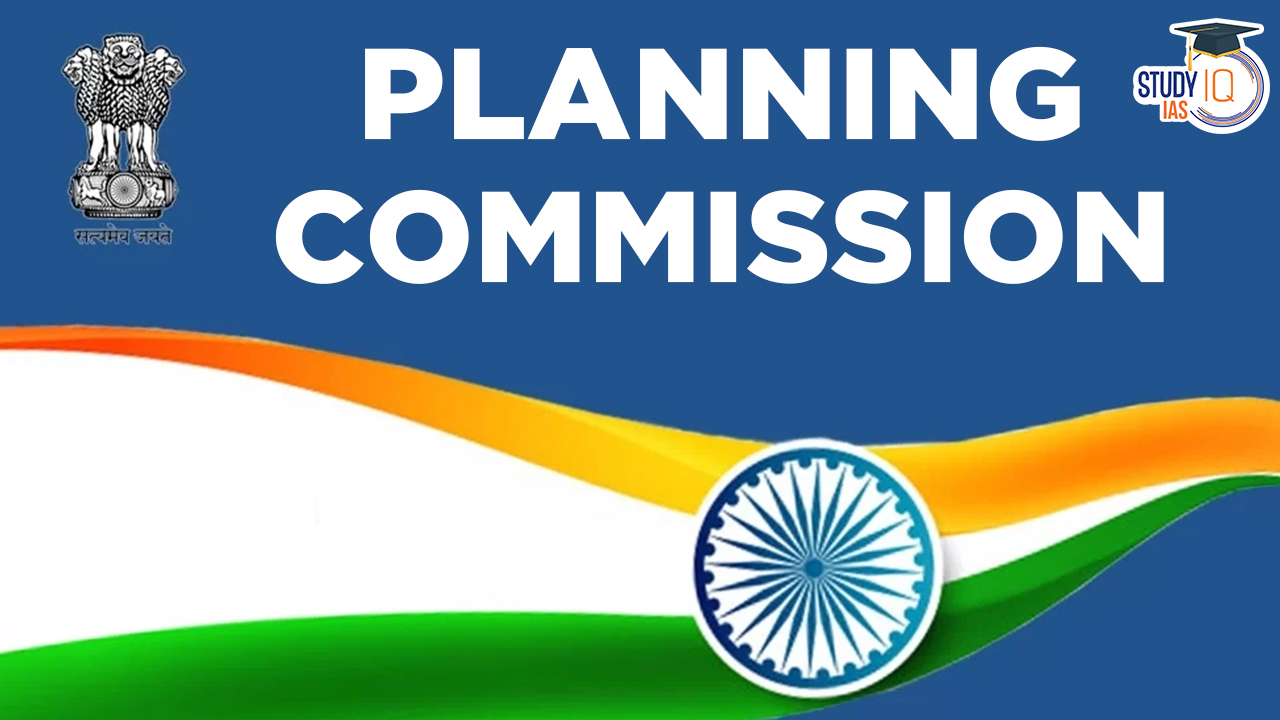Table of Contents
Planning Commission of India
The Planning Commission of India was an institution established in 1950 with the aim of formulating Five-Year Plans for the country’s economic development. It served as the central planning body that coordinated and assessed various economic and social policies in India.
The Planning Commission consisted of a chairman, who was usually the Prime Minister of India, and several members, including representatives from various government departments, economists, and experts from different fields. The commission played a key role in formulating national plans, setting targets for various sectors, and allocating resources accordingly.
After the Twelfth Five-Year Plan (2012-2017), the Government of India ceased the Five-Year Plans and introduced a new think tank organization known as the NITI Aayog. The primary focus of the Niti Aayog is on long-term planning and sustainable development goals.
Planning Commission Structure
Under the overall supervision of the National Development Council, the Planning Commission was chaired by the Prime Minister as its Chairman. The Planning Commission was headed by a Deputy Chairman, who was appointed by the Prime Minister of India. The Deputy Chairman was supported by full-time members, who were experts in various fields such as economics, industry, agriculture, education, health, and infrastructure.
In addition to the full-time members, the Planning Commission also had part-time members, who were appointed from various states, union territories, and specialized fields. The part-time members provided the commission with inputs and feedback on the development needs of their respective areas and sectors.
The Planning Commission also had a Secretariat, which was responsible for providing administrative and technical support to the commission. The Secretariat was headed by a Secretary, who was a senior civil servant appointed by the government.
List of Planning Commission Chairman
Here is a list of the Chairman who served the Planning Commission at different times.
| Planning Commission Chairman | Year of Service |
| Jawaharlal Nehru | 1950 |
| Gulzarilal Nanda | 1967-1969 |
| D. P. Dhar | 1969-1971 |
| Yashwantrao Chavan | 1971-1977 |
| Durgabai Deshmukh | 1977-1980 |
| C. Subramaniam | 1980-1982 |
| Pranab Mukherjee | 1982-1984 |
| Rajiv Gandhi | 1984-1989 |
| V. P. Singh | 1989-1990 |
| P. V. Narasimha Rao | 1990-1991 |
| Manmohan Singh | 1991-1996 |
| Inder Kumar Gujral | 1997-1998 |
| Atal Bihari Vajpayee | 1998-2004 |
| Manmohan Singh | 2004-2014 |
| Narendra Modi | 2014-2015 |
Planning Commission Objective
The Planning Commission of India had several objectives, which were aimed at achieving the overall goal of promoting economic development and social welfare in the country. These objectives evolved over time, as the commission’s role and priorities changed with different five-year plans. Here are some of the key objectives of the Planning Commission:
- Balanced and Equitable Economic Growth: The commission aimed to promote balanced and equitable economic growth across different sectors and regions of the country. This meant reducing regional disparities, promoting the growth of underdeveloped areas, and ensuring that the benefits of development reached all sections of society.
- Efficient Resource Allocation: The commission aimed to allocate resources efficiently and effectively, ensuring that the available resources were used optimally to achieve the desired goals. This involved identifying priority sectors, assessing resource requirements, and allocating funds accordingly.
- Employment Generation: The commission aimed to promote employment generation through various policies and programs. This included promoting labour-intensive industries, improving skills and education, and providing incentives for job creation in different sectors.
- Poverty Alleviation: The commission aimed to reduce poverty and improve the standard of living of the people, particularly those from disadvantaged and marginalized communities. This involved promoting inclusive growth, providing social safety nets, and implementing targeted programs for poverty alleviation.
- Infrastructure Development: The commission aimed to promote the development of infrastructure, such as roads, railways, ports, and airports, to support economic growth and social development. This involved identifying key infrastructure projects, assessing their feasibility, and providing necessary funding and support.
- Agricultural Development: The commission aimed to promote agricultural development, recognizing the sector’s importance in providing food security, creating employment opportunities, and supporting rural livelihoods. This involved promoting agricultural research, providing agricultural inputs and credit, and improving market access for farmers.
Read about: Agneepath Scheme
Planning Commission Functions
The functions of the Planning Commission of India were diverse and encompassed various aspects of economic planning, resource allocation, and development monitoring. Here are some of the key functions performed by the Planning Commission:
- Formulating Five-Year Plans: The Planning Commission was responsible for formulating comprehensive five-year plans for the country’s economic and social development. These plans outlined the goals, targets, and strategies for different sectors, taking into account the prevailing economic conditions and long-term objectives.
- Allocating Resources: One of the primary functions of the Planning Commission was to allocate financial resources among different sectors and states. It assessed the resource requirements of various sectors, considered their relative importance, and recommended the allocation of funds and resources accordingly. This involved prioritizing sectors, such as agriculture, industry, infrastructure, education, and health, based on developmental needs and policy objectives.
- Assessing Development Needs: The Planning Commission conducted studies and assessments to identify the development needs and challenges in different sectors and regions. It analyzed data, gathered information, and consulted with experts to understand the socio-economic issues and formulate appropriate policies and strategies.
- Monitoring Plan Implementation: The commission played a crucial role in monitoring the implementation of various development programs and projects outlined in the five-year plans. It assessed the progress, reviewed the performance, and evaluated the outcomes of these initiatives to ensure that they were on track and aligned with the set objectives.
- Evaluation and Feedback: The Planning Commission conducted evaluations and reviews of the implemented policies and programs. It analyzed the impact, effectiveness, and efficiency of the developmental interventions, providing feedback to the government and making recommendations for improvements and modifications.
- Coordinating with Central and State Governments: The commission acted as a coordinating body between the central government and state governments. It facilitated discussions, consultations, and collaborations to ensure that the national development plans were aligned with the priorities and initiatives of different states. The Planning Commission also facilitated inter-ministerial coordination to promote integrated and cohesive planning.
- Engaging with Experts and Stakeholders: The Planning Commission engaged with experts, economists, scholars, and stakeholders from various sectors to gather inputs, seek expertise, and incorporate diverse perspectives into the planning process. It held consultations, organized seminars, and invited experts to contribute to policy formulation and decision-making.
- International Cooperation: The Planning Commission represented India in international forums and organizations related to development and planning. It engaged in discussions, collaborations, and exchange programs with other countries and international bodies to share experiences, learn best practices, and explore opportunities for cooperation.
Read about: List of Beti Bachao Beti Padhao Scheme
First Planning Commission
The First Planning Commission of India was constituted in 1950 with the objective of formulating and implementing the country’s first Five-Year Plan.
| Particulars | Details |
| Constitution |
|
| Achievements |
|
Overall, the First Planning Commission, under Nehru’s leadership, successfully formulated and implemented the First Five-Year Plan, driving sectoral development, infrastructure growth, and social welfare programs.
Read about: Important Schemes of Indian Government
Planning Commission UPSC
The topic of the Planning Commission is important for UPSC (Union Public Service Commission) as it is a part of the UPSC Syllabus for various exams conducted by the commission. UPSC Online Coaching and UPSC Mock Test often cover this topic as it holds significance in India’s governance and economic planning. Understanding the functions, objectives, and achievements of the Planning Commission is crucial for aspirants preparing for UPSC exams to gain insights into India’s developmental policies, economic planning, and government structure.
Read about: Five Year Plans of India


 Goods and Services Tax (GST), Objectives...
Goods and Services Tax (GST), Objectives...
 World Oceans Day 2025, History, Theme, S...
World Oceans Day 2025, History, Theme, S...
 World Environment Day 2025, Theme, Histo...
World Environment Day 2025, Theme, Histo...





















